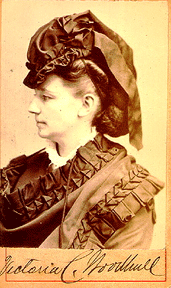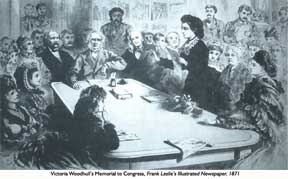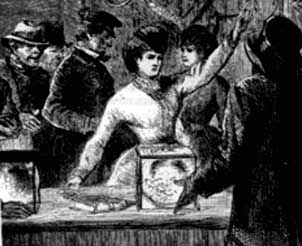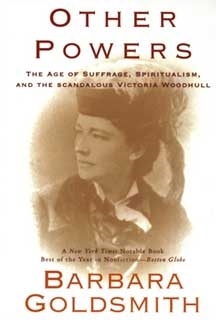 |
| Victoria Claflin Woodhull, 1838-1927 Photo courtesy of William L. Clements Library, University of Michigan |
Recently, when I mentioned to a friend that the title of my book was Other Powers--The Age of Suffrage, Spiritualism and the Scandalous Victoria Woodhull, she asked: "Just who was Victoria Woodhull anyway?" It seems a simple question, but Victoria was not a simple person. She was conceived in 1837, during the frenzy of a religious revival in Homer, Ohio. Her father was an itinerant con man and a thief; her mother was illegitimate, illiterate and a religious fanatic. As a child, Victoria was raised in filth and squalor, beaten and starved, given little education and exploited in her father's traveling carnival show as a clairvoyant and fortune-teller. Unexpectedly, she demonstrated such powers as accurately recalling past events and predicting future ones, finding missing objects and people, and affecting cures. She also relayed messages from loved ones who had "passed over."
From childhood, Victoria maintained that she was guided and protected by the spirits, who occasionally let her visit a utopian world in heaven unlike the chaotic, miserable world in which she lived. Like Joan of Arc, she listened to voices that told her she would rise from poverty one day to become "ruler of the nation." At 15, in order to escape her father's brutality, Victoria eloped with an alcoholic doctor who fathered a retarded son and so botched the delivery of their daughter that the baby nearly bled to death. After five years, Victoria left him and struck out on her own. Eventually, her belief in the spirits enabled her to form alliances with such powerful men as Commodore Cornelius Vanderbilt, to become the first woman to own a Wall Street investment firm, to found her own newspaper, to speak before Congress demanding that women be given the vote and finally, to run for U.S. President in 1872 against the popular incumbent, Ulysses S. Grant, and the powerful newspaperman, Horace Greeley. In short, she set America on its ear.
 |
| Victoria Woodhull's Memorial to Congress, Frank Leslie's Illustrated Newspaper, 1871 |
In the decade that it took to write my book, I came to know Victoria Woodhull well, and she taught me a great many lessons -- not the least of which was that the common wisdom on most subjects is frequently wrong. She made me realize that people must always think for themselves and never accept circumstances that seem unfair, unkind or uncomfortable.
Of course, Victoria's time was a much more difficult one for women, who then had almost no rights to property or person. If a married woman worked, her wages were given directly to her husband. She could not dispose of her property upon death. If she divorced, she automatically forfeited custody of her children. Women could not enter universities, law schools or medical schools. They could not serve on juries, and they could not vote.
Most significantly, women had no control over their own bodies: There were no laws to protect them from physical abuse at the hands of their husbands or fathers, although some states stipulated the size of the objects that might be used to inflict discipline. They had no right to deny their husbands sexual access. The professions open to women were few: domestic drudgery, factory work, teaching, prostitution and, for the exceptional few, writing.
 |
| Victoria Woodhull is kept from voting (1871) |
Men were allowed all means of sexual license, but a woman who committed adultery was subject to a jail sentence. In 1868, from the lecture platform, Victoria Woodhull boldly instructed women to demand a single sexual standard and not to accept the view that sexual desire in females was vulgar. "What! Vulgar!" she said. "The instinct that creates immortal souls vulgar...be honest...it is not the possession of strong powers that is to be deprecated. They are that necessary part of human character."
Victoria preached a doctrine called "Free Love" that included the odd notion of marrying for love, as well as an easement of the divorce laws. She was radical even by today's standards, asserting: "Women are entirely unaware of their power. Like an elephant led by a string, they are subordinated by just those who are most interested in holding them in slavery...Sexual freedom means the abolition of prostitution both in and out of marriage, means the emancipation of woman and her coming into control of her own body, means the end of her pecuniary dependence upon man...means the abrogation of forced pregnancy, of anti-natal murder of undesired children and the birth of love children only." Ideas stated in the extreme make one think and question and argue, and that was what Victoria accomplished.
Victoria Woodhull was a fervent Spiritualist who searched for meaning in a society not so different from our own, in that most people felt overwhelmed by financial manipulations and technical achievements they could not comprehend. They felt they had little control over their own destinies. Women, in particular -- even the strongest -- desperately needed the courage to combat the criticism and isolation they felt in the battle for their most basic rights. Victoria's belief in spirit guidance empowered her and her followers to challenge the law, the church and the entrenched male establishment.
Victoria's spiritualism usually is dismissed as a fad by historians, but in studying her, I realized that many of her beliefs were a utopian version of what people already accepted. For example, the Spiritualists' conviction that the dead can guide us did not differ radically from the view of the regular clergy. Even today, when our loved ones die, clergymen tell us that they are not gone -- that they are with us still in thought and deed, that they are always by our side. Victoria's friend, Isabella Beecher Hooker, summed it up when she wrote: "I know she [Victoria Woodhull] has visions and is inspired by spiritual influences, but her inspiration seems very like my own, a simple reliance on a Heavenly Father."
Victoria demonstrated that a belief in oneself gives us the strength to accomplish a great deal. She was a pioneer in many things we think about today: diet, exercise, comfort in dress. In her day, many people ate seven-course dinners accompanied by liquor and wine, but Victoria adhered to the diet prescribed by Sylvester Graham (known for the tasty, ginger-colored crackers that still bear his name). Graham had been a sickly child and cured himself through proper diet. He recommended no alcohol, caffeine, meat, lard or other types of shortening.
Women of the day were thought desirable if they were languorous and frail, but Victoria advocated vigorous exercise, rode horseback and walked at least three miles a day. She said that drinking at least two pints of water a day and eating fresh fruit were accountable for her good health and vigor.
 |
Whenever I see a woman tottering about on 5-inch stiletto heels, I have a fantasy that Victoria is walking down the street in her sensible boots and says to her, "My dear young girl, you are ruining your health and risking a terrible accident." Women's clothes in her time cinched in the waist so tightly that organs were often displaced. The dresses were so heavy that women moved like hobbled horses. Not Victoria. She often wore men's clothing and urged other women to do the same.
While male physicians did not examine female bodies, they nonetheless prescribed morphine, isolation, purging, bloodletting and starvation as cures for most female ills. Victoria, on the other hand, embraced a benign alternative medicine. She practiced homeopathy, a treatment begun by Dr. Samuel Hahnemann, who took a minuscule amount of a disease-causing agent and diluted it with liquid to create what he called a "spiritlike essence." Dr. Hahnemann believed that when this substance was introduced into the body, the person would be cured of the disease. Victoria was also a well-known "magnetic healer." The use of therapeutic magnets dates to the ancient Greeks, who used them to halt bleeding, soothe inflammation, purge infection and promote general healing. The theory is that the magnets themselves do not heal, but induce the body to heal itself. Many of the medical treatments in which Woodhull believed are becoming increasingly popular today, as is the conviction that we are participants in our own good health and medical treatment.
Because Victoria Woodhull shocked and astounded and antagonized, a campaign was organized to bring her down. She was jailed repeatedly on charges of publishing pornography, and the press depicted her as "Mrs. Satan" and "The Prostitute Who Ran for President." But, in truth, she was a woman who lived a century before her time. The lessons she taught -- to question, to be honest, to believe in your power, to value your mind and body, to fight for what is right -- are all lessons for today.
Page created on 8/25/2011 8:48:02 PM
Last edited 1/9/2017 6:30:11 PM
